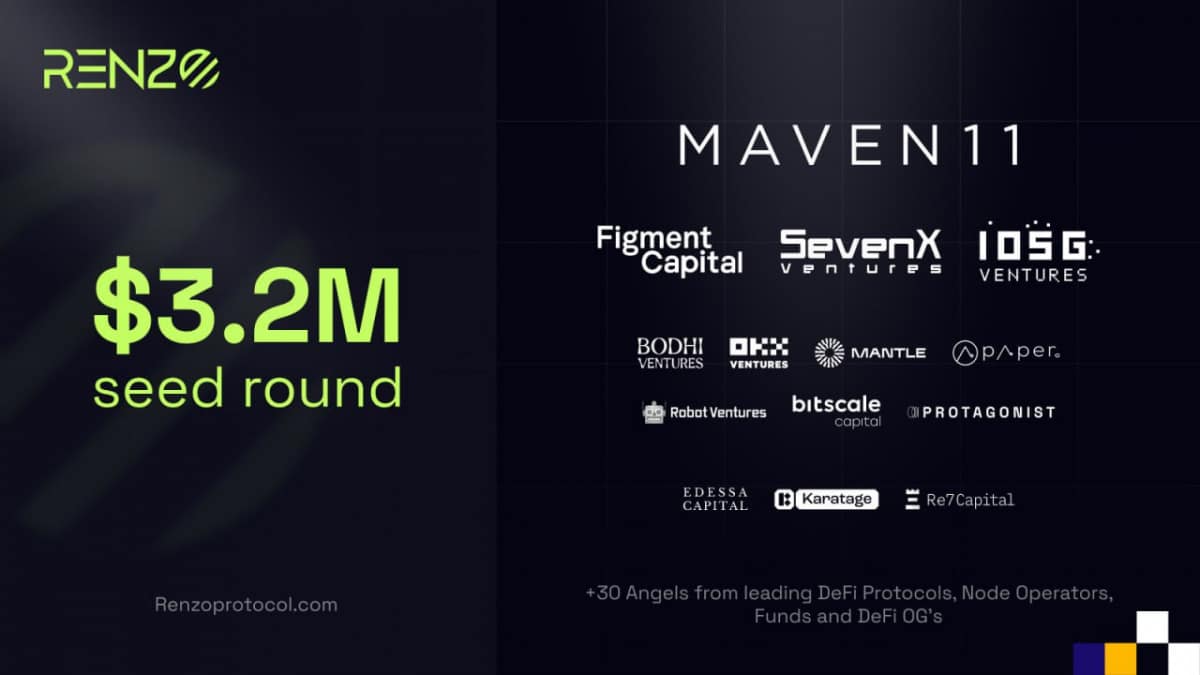
Posted: Jan 15, 2024 1:00 PM Updated: Jan 15, 2024 8:09 AM
briefly
DeFi protocol Renzo announced a $3.2 million seed round, backed by a leading cryptocurrency native fund.

DeFi protocol Renzo announced a $3.2 million seed round, backed by a leading cryptocurrency native fund. The funds will be used by Renzo to build the liquid re-staking protocol recently published on EigenLayer.
Maven11 led the Renzo seed round, which saw follow-on investments from Figment Capital, SevenX, IOSG, and Paper Ventures. The increase comes at a time when interest in EigenLayer’s liquidity re-staking is at an all-time high. More than 2,000 users have deposited $20 million (9K ETH) of ETH into Renzo since the protocol was deployed in late December.
Commenting on the funding round, Renzo founding contributor Lucas Kozinski said: “We are excited to welcome so many prominent investors who share our vision of making re-staking accessible to everyone. With their support, we will build on the new features provided by EigenLayer and make Renzo the most trusted on/off ramp for Ethereum re-staking.”
Balder Bomans, Founder and Managing Partner of Maven11, added: “We believe Renzo’s focus on security, risk mitigation and open finance is the best way to address the fluid and decentralized governance process for selecting Actively Validated Services (AVS) at Eigenlayer. . Renzo provides risk-adjusted strategies and liquid representation while providing security to repeat users.”
Renzo uses a combination of smart contracts and operator nodes to provide an automated liquidity redeposit strategy to EigenLayer. This allows you to more easily manage your liquidity and take advantage of your ability to participate in Ethereum staking while exploring additional re-staking opportunities. Renzo allows you to re-stake ETH and Liquid Stake Tokens (LST) and utilize them as DeFi collateral to earn compounded rewards.
To support decentralization, Renzo is governed by a DAO that manages operators, AVS reclamation strategies, and protocol parameters. Future releases will focus on institutional on/off ramps and introduce cross-chain re-staking, integration with lending markets, and support for liquidity aggregators and vault products.
Renzo utilizes ezETH, a re-staked ETH position that users can mint by depositing LST or ETH into the platform’s smart contracts. This fully supported ERC20 token can be used across the DeFi space to generate rewards in ETH, USDC, and Actively Validated Services (AVS) tokens, similar to cbETH and rETH.
About Renzo
Renzo is a liquid re-staking platform built on EigenLayer that allows users to earn compounded rewards through ETH re-staking. With an automated floating yield strategy, Renzo acts as a perfect on/off ramp for re-staking, leveraging a combination of smart contracts and operator nodes to ensure optimal risk/reward strategies.
https://www.renzoprotocol.com/
disclaimer
In accordance with the Trust Project Guidelines, the information provided on these pages is not intended and should not be construed as legal, tax, investment, financial or any other form of advice. It is important to invest only what you can afford to lose and, when in doubt, seek independent financial advice. For more information, please refer to the Terms of Use and any help and support pages provided by the publisher or advertiser. Although MetaversePost is committed to accurate and unbiased reporting, market conditions may change without notice.
About the author
Gregory, a digital nomad from Poland, is not only a financial analyst but also a valuable contributor to various online magazines. With his extensive experience in the financial industry, his insights and expertise have been recognized by numerous publications. Making effective use of his spare time, Gregory is currently devoted to writing books on cryptocurrency and blockchain.
more articles


Gregory, a digital nomad from Poland, is not only a financial analyst but also a valuable contributor to various online magazines. With his extensive experience in the financial industry, his insights and expertise have been recognized by numerous publications. Making effective use of his spare time, Gregory is currently devoted to writing books on cryptocurrency and blockchain.

